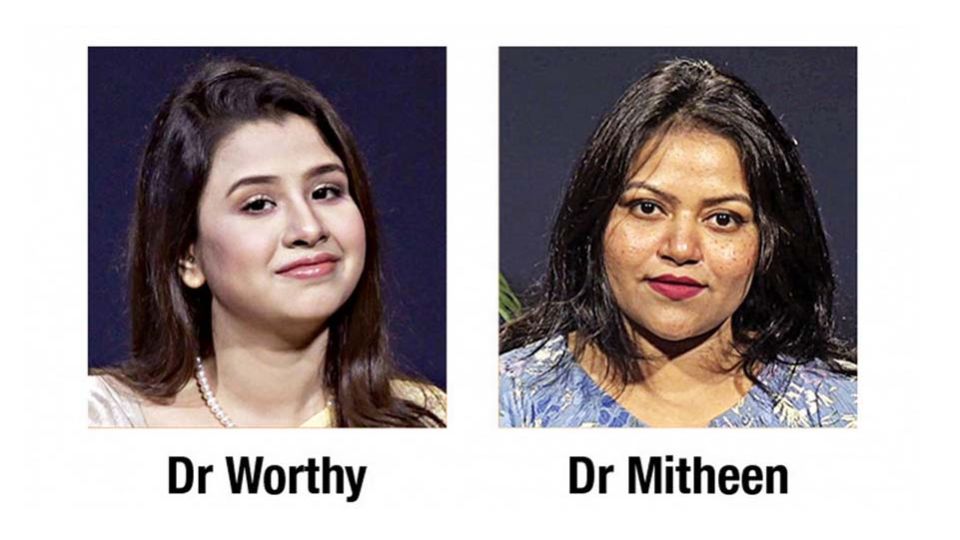October 10, 2024
DHAKA – On July 18, Dhanmondi-27 had become one of the flashpoints when protesters took to the streets to enforce the “complete shutdown” called by the Anti-Discrimination Student Movement.
As violent clashes broke out between the demonstrators and police, who were backed by the then ruling party activists, the roads and alleyways had turned into a warzone, resulting in deaths and myriad injuries.
However, many of those wounded were too afraid to seek medical help.
Cops were stationed in front of a number of hospitals, causing a fear of arrest in anyone who sought treatment. Many were overwhelmed with patients while others refused to provide treatment. Some charged exorbitant fees.
Amid the bloody violence, two young doctors – Dr Worthy Jukhrif and Dr Hritisha Aktar Mitheen – stood out through their sheer sense of duty.
Not only did they open their doors to the wounded, they converted their building’s garage on Satmasjid Road into a makeshift clinic.
Other residents provided ample support with supplies — bandages, antiseptics, orsaline, mineral water, and even dry biscuits.
In two days, Worthy and Mitheen treated over 100 injured people — turning the garage into a sanctuary for those who had nowhere else to turn.
DUTY TO THE PEOPLE
Around 2:00pm on July 18, as clashes went on, tear gas clouded the streets and nearby alleys, while rubber bullets were strewn almost everywhere.
“For the first time in my life, I heard the sound of bullets. Something I had only seen or heard on television was now frighteningly close,” remembered Worthy, who is an OT assistant at Ibn Sina Hospital and also works as a health show presenter on a private television channel.
From her balcony, she saw injured students huddled below — bloodstains on their clothes, terror in their eyes.
“I knew I couldn’t just stand by.”
She rushed downstairs, where fellow residents — including Dr Mitheen, a former medical officer at Labaid Specialised Hospital — had also gathered.
“Humanity is what I acted upon. I couldn’t hold myself back,” said Mitheen.
Residents of the building quickly brought whatever first-aid supplies they could find.
One of the doctors’ neighbours, Khurshid Jahan, said, “Seeing them wounded only reminded us that we have children too and we must act.
“As ordinary people, we had very little to offer, but I tried to provide as much comfort to the students as was possible while Dr Worthy and Dr Mitheen treated their wounds. My husband and daughter provided them with water, first-aid supplies and clothes.”
At first, the wounded were being treated in the building’s reception area. As more people arrived, two beds were set up in the garage and treatment continued there.
The doctors tried to provide utmost care – they removed pellets, dressed deep wounds and offered counselling.
Worthy said, “Some of the injuries were horrific – backs, heads and chests riddled with shotgun pellets lodged deep into their muscles. At least 10 victims came with pellets in their eyes.”
The more severe cases were referred to trusted clinics that were willing to help, despite the fear of a ban hanging over their heads.
One particular patient left a lasting mark on Worthy – a 10-year-old who had come with pellets all over his body.
“I treated him and told him to go home. Within a few hours, he returned with another pellet in his forehead. I treated him again and he left.
“Later that day, some students showed me a video of the same boy, lying lifeless on the street … I didn’t know his name, but I couldn’t stop thinking about him … I still suffer from sleepless nights at the thought.”
The next day – July 19 – the curfew was imposed and helicopters hovered overhead.
But the doctors continued treating the wounded – students, guardians, pedestrians, whoever came for help.
Even when supplies ran low, the building’s residents reached out to pharmacy owners and managed more.
As word spread, more and more people came to this unlikeliest of clinics for help, when all other doors were slammed shut on their faces.
THREATS AND SURVEILLANCE
Around 8:30pm on July 19, police fired tear gas shells towards their building, situated on Satmasjid Road, forcing them to close the gates and bring students inside for safety.
Some men in civilian clothes questioned the building’s guards, asking who the residents were and why they were treating protesters. They threatened them with dire consequences if anyone stepped outside.
“Initially, I didn’t focus on the threats. But when they asked about us, I was a little nervous. We, however, carried on with our work … Our primary duty was to humanity. Whatever I did, I did for my country,” Mitheen said.
Soon enough, residents began noticing drones flying above the building.
“Some colleagues from the media informed me that only three houses in the Dhanmondi area were under surveillance. Ours was one of them,” Worthy said, adding that their phones were also being tracked by then.
Despite the anxiety and fear of arrest or interrogation, nothing could come in between these doctors and their sense of duty.
“I found peace knowing that I treated those students out of my duty to my profession. Helping others should be driven by humanity, not politics – blood carries no political identity.
“Despite everything, the gratitude from the students made it all worthwhile.”
After the fall of the Sheikh Hasina-led government, the students who had found refuge in the garage returned on August 6. They thanked the two doctors for standing by them when no one else did.
For the new Bangladesh, Mitheen hoped that no one else would fall victim to oppression.
“We achieved victory for the brothers and sisters who gave their lives. The shedding of their blood must not go in vain.”


